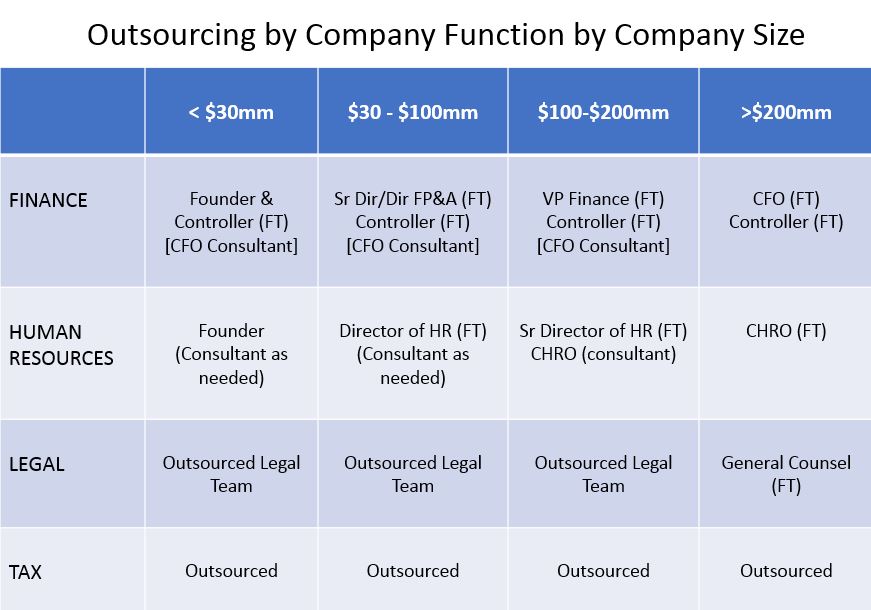By Stephanie Roberts
Founders of startups (specifically companies already generating revenue) face a challenging set of priorities. They must focus on setting the right strategy while leading multiple functions (Finance, HR, Legal) as they grow their companies. They don’t yet have the scale to hire a fulltime, C-Suite executive team but they still need to ensure the right foundation is built from goal setting, performance management, policies, and procedures. As a consulting CFO for rapidly growing companies, I am often asked by my clients about the best way to navigate through this period using outsourcing as a solution as they scale their companies in size from under $30M to greater than $200M in revenue.
When Does Outsourcing C-Level Talent Make Sense?
As a company evolves and scales, the balance between outsourcing and hiring for full-time positions changes (by function) as the enterprise reaches various pivot points in size and complexity. Internal functions need to gain breadth and depth and specialize as the business get more complicated and the need for compliance and reporting increases.
Outsourcing C-Suite talent makes sense in a few different situations:
- The most common is when there is a strategic need but not on a full-time basis. Hiring an expert consultant or interim leader to guide a functional team for 1-2 days a week or on an as needed basis is often sufficient.
- The other situations which argue in favor of outsourcing vs hiring-in fulltime expertise include:
- To coach your Director/Sr. Director functional heads
- To temporarily fill a critical open position
- For project-based system implementations (e.g. ERP implementations)
When Should a Startup Hire a Fulltime Employee in the C-suite?
The chart below is a general guideline showing when companies typically need to shift from part-time and full-time outsourced solutions to full-time hires by functional area. However, keep in mind that a general guideline is only one indication of staffing needs and that the complexity of the business and/or the relative skills and experience of the team in place can substantially change skill level requirements for any given function.

First, we always recommend having the advice of a seasoned CFO to consult you on your strategic decisions during this period of growth. This allows a Founder and team to avoid making costly mistakes and prioritize the right decisions. Beyond this for Finance, we recommend that the first fulltime hire be a strong Controller (<$30M in revenue) then, once the company reaches >$30M in revenue that they hire a Director/Sr. Director for FP&A.
For Human Resources, a similar scenario occurs with the hire of a Sr. Director of HR at $30M because companies can generally operate without a Dir/Sr. Director of HR until they reach a critical mass of employees.
Additionally, the most common approach in startups is for the Founder to lead both Finance and Human Resources functions but outsource more technical specialty areas like Tax and Legal on a part-time basis until they reach enough scale to justify hiring full-time resources.
Benefits from Using a C-Suite Consultant vs Hiring a Director
Strategic Depth of Experience
C-Level consultants, for example CFO or CHRO-level experts, can provide invaluable advice to Founders on a variety of topics including (but not limited to) fundraising, debt, equity, 409a valuations, preparing for an IPO, benefit plans, tax strategy, financial systems, insurance, acquisitions, compensation strategy, etc. While a highly experienced Director at a startup might have the breadth of experience to guide these strategic decisions, in my experience this is unlikely, especially since emerging companies often have to compete for prized Director-level talent with larger enterprise companies.
Coaching Functional Teams
Another benefit from using an external outsourced C-level consultant is to build skills and capabilities of your in-house teams. By pairing an existing team member (e.g., Director of FP&A) with an experienced CFO consultant as a coach and mentor, strategic capabilities within the in-house team can be built quickly. This can be powerful for the entire management team as peers on the executive team (CIO, CEO, CMO, etc.) learn to work more effectively together as a decision-making body.
Temporary Replacements for C-Suite Team Members
The most common situation that I see around outsourced talent is when you have a critical executive-level position that is vacated for some reason during a critical time at the company (e.g., during an audit, while fundraising, or development of the annual budget). Your company can’t afford to lose momentum. Bringing in an experienced leader who can hit the ground running on Day One is critical to fill this vacancy while you search for a permanent hire. The consulting executive can then on-board the new team member ensuring a seamless transition. This is an enormous benefit to the CEO and his or her team to focus on other mission critical priorities.
Avoiding the Pitfalls of Outsourcing
The biggest pitfall I see when companies outsource C-level talent is that they want to hire an external consultant to come fix a problem, but they haven’t clearly articulated what success looks like. Great CEOs take the time to be really clear about what they expect by a certain date and ensure that their team can deliver on that. The worse-case scenario is when a company experiences scope creep in a consultant’s role because no one was clear upfront about requirements, followed by associated cost over-runs in consulting fees. When this occurs, your outsourced C-level consultant has an ethical obligation to identify and communicate cost effective restructuring of available resources, i.e., you did not hire your consulting CFO to perform and bill for controller-level services. This is a common occurrence with clients at FLG Partners, where we work diligently to ensure the most cost effective and timely solution for our clients’ needs.
Of course, all of this is just a guideline and each company situation is different. Feel free to call any of the CFO Partners at FLG to run your specific situation by us and we will guide you on some options for you to consider. Or if you are in the need of an interim CFO or CFO coaching for your internal team, come talk to us at FLG Partners. We are glad to help.
FLG Partners is a partnership of experienced CFOs delivering to CEOs and Boards high value, interim and permanent leadership – exclusively at the C-level.



